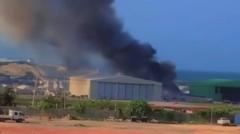The Trump administration is divided over the future of U.S. counterterrorism operations in Somalia, with contrasting opinions on the potential closure of the embassy in Mogadishu after recent militant gains.
Trump Administration Faces Strategic Dilemma on Counterterrorism in Somalia

Trump Administration Faces Strategic Dilemma on Counterterrorism in Somalia
Internal debates emerge as officials weigh the risks of closing the U.S. embassy amidst heightened threats from Al Shabab militants.
Recent victories by Islamist groups in Somalia have escalated tensions within the Trump administration regarding U.S. military operations in the region. Some State Department officials suggest that closing the U.S. embassy in Mogadishu and recalling most American personnel may be necessary for security, given the rising threat from Al Shabab militants. Conversely, officials from the National Security Council argue that such a move could undermine confidence in Somalia's government and trigger its swift collapse, advocating instead for an escalation of U.S. support and operations in the region.
These conflicting stances reflect deep-seated concerns stemming from historical foreign policy failures, such as the fatal 2012 Benghazi attack and the collapse of the Afghan government following U.S. troop withdrawal in 2021. This dilemma has intensified internal divisions, particularly as President Trump’s counterterrorism adviser, Sebastian Gorka, pushes for a more aggressive military approach against militant groups, while others within Trump’s coalition favor a more isolated stance, questioning the U.S. interests in the region.
Last week, Gorka held an interagency meeting at the White House to tackle the strategy for Somalia, but it concluded without a definitive plan. As the U.S. grapples with its ongoing involvement in Somalia, the administration continues to face scrutiny over its long-term approach in a country marked by chaos and persistent conflict.






















